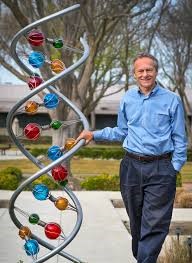Tell us about yourself
I came to San Francisco in 1980 to do a pediatric residency at UC San Francisco. While I began in clinical medicine, it was the scientific environment of the Bay Area that kept me here. From San Francisco, I moved to Berkeley and the Lawrence Berkeley National Laboratory. There I directed a research Institute, DOE Joint Genome Institute, that played a major role in the Human Genome Project, as well as in determining the genetic blueprints of thousands of plants, animals and microbes.
What do you look for in the organizations you support?
My background in pediatrics and training young scientists has drawn me to organizations that seek to enhance the education and careers of young people. Specifically, I enjoy supporting young scientists who are in the middle of crucial transitions from being students to becoming professional scientists. This led to my involvement in Science Corps, a non-profit Bay Area organization which works at building STEM (science, technology, engineering and mathematics) capacity worldwide and encouraging a more global perspective in the next generation of scientists.
Another effort I support is Enriching Lives through Music (ELM). ELM is a music education program for young people in the Canal district of San Rafael. ELM inspires its students to thrive emotionally, socially and academically through music education, performance and engagement.
What issues are you passionate about?
I believe there is an untapped potential for scientists to make contributions that extend to the technologically less developed world. The rigors of scientific training offer minimal opportunities for scientists to develop a global perspective. This contrasts with the multiple avenues available for physicians to contribute abroad while gaining experience that can shape their careers.
I learned firsthand about the lack of international opportunities for scientists through my son. After completing his STEM PhD, he searched widely for a way to get off the insular “science track” and put his science background to work in the developing world. He could not find an organization that offered such an opportunity. Through an extensive word of mouth campaign, he eventually stumbled upon a school in the rural Philippines that needed a science teacher. He spent six months there teaching and developing science curricula. The experience was wonderful at many levels—inspiring for his students and life changing for him.
He has now returned to the U.S. and is continuing the academic science track at UC Berkeley. His work in the Philippines was such a positive experience that, with the help of a group of young scientists, we formed Science Corps to offer this experience to other scientists. Science Corps provides an opportunity for recent STEM PhD graduates to teach and develop scientific capacity in regions that lack access to quality science education. Science Corps Fellows inspire the next generation of STEM professionals by designing scientific curricula, teaching, hosting workshops, and conducting science projects that offer a hands-on STEM experience. Science Corps is in a young non-profit, and we would welcome input from other TSFF donors that are interested in building global STEM capacity. If you support the mission and would like to become involved in helping the organization grow, please get in touch.
What are your short- and long-term goals for your philanthropy?
There are many technologists and scientists who have valuable skills and strong interests in making contributions beyond their local environment. Unfortunately, there are few avenues for doing so. I would like to encourage the development of more opportunities like Science Corps to narrow this gap. Coupled with this, I would like to support scientists in academics and in industry to contribute to reducing inequalities experienced by the “technological have nots.”


